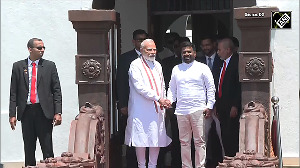 Admitting that corruption is the "biggest issue" that is "bleeding people dry", Rahul Gandhi on Saturday sought to reach out to the India Inc by saying that "arbitrary powers" were holding up projects.
Admitting that corruption is the "biggest issue" that is "bleeding people dry", Rahul Gandhi on Saturday sought to reach out to the India Inc by saying that "arbitrary powers" were holding up projects.
Interacting with business leaders in New Delhi and responding to their concerns, the Congress vice president favoured rule-based system in clearances to correct the situation.
Asserting that the United Progressive Alliance government was committed to deal with corruption and push growth, he outlined the steps taken by the UPA government, including enactment of Lokpal, to combat graft.
Gandhi talked about the problems of inflation, clearances, accountability and transparency while underlining the need for pushing the growth to alleviate poverty and making the country the largest economy by the time it turns 100 years old.
"I am in complete agreement with the need for regulatory system to be rapidly and radically modernised. Frankly, there are no excuses for the length of time required to clear some of these projects. We are fast-moving economy. We cannot allow you to be held back by slow decision-making. Accountability has to be clear, fixed and time-bound," he said addressing the Federation of Indian Chambers of Commerce and Industry annual general meeting.
"The biggest problem is absolute arbitrary powers at all levels of the system. This is what we face.. In India, there are lot of arbitrary powers. The environment minister or the chief minister can take any decision he wants," he said while responding to concerns of the industry that clearances were holding up projects.
"The real issue in all these things, whether land acquisition or environment it is arbitrary power," Gandhi said, while advocating the need for eliminating the system of arbitrary powers.
He said the "paradigm" in the country has changed and in this scenario, "we have to build rule-based structure... we have to get used to the new paradigm. We have to move away from the arbitrary idea that a chief minister and an environment minister can do anything."
Flagging the concerns over price rise, which Congress attributed as one of the reasons for the party's debacle in recent assembly elections, Gandhi said that beating inflation is top priority.
"High inflation on the back of high food prices is an immediate concern. It has stretched household budgets and constrained industrial growth. It hurts our people everyday. Beating inflation is our top priority.
"We must crack down on hoarding and profiteering. We must ease infrastructure bottlenecks and rapidly modernise the supply chain from field to plate," he said.
Gandhi also chose the occasion to claim that it was the UPA government which did the maximum to fight corruption, which he termed as an "unacceptable burden on the people of our nation".
"Corruption is bleeding our people dry. It is an unacceptable burden on the people of our nation. We must fight corruption with all our strength and determination," he said but asserted "this government has done more than any other government to combat corruption.... The Congress Party has developed a framework against corruption."
Noting that the passage of Right to Information Act by the UPA has been the most powerful weapon in the fight against corruption, he said, "the power of information is finally in the hands of the people. This has created a paradigm shift. Few governments have had the courage to enact legislation that rendered their processes more transparent and open to scrutiny."
Gandhi added that he was proud to say that the RTI has shown all concerned "the writing on the wall and, in some cases, it has shown them the wall of Tihar Jail!"
He listed in this regard the steps like rejecting the ordinance to overturn a court verdict that held that convicted criminals be kept out of Parliament and assembly and passage of Lokpal Bill but added "we need to go further."
Gandhi said that the passage of six anti-corruption bills is critical to fight corruption.
He felt that while the amendment to the Prevention of Corruption Act will protect honest officers and be much more effective against those who are corrupt, the Grievance Redressal Bill will ensure that every citizen has the right to timely delivery of goods and services by their government.
Noting the "frustration" of the industry with regard to environmental clearances delaying projects unduly, Gandhi acknowledged that "there is excessive administrative and judicial discretion. The loopholes are so big you can drive a truck through some of them".
Image: Congress vice president Rahul Gandhi











 © 2025
© 2025